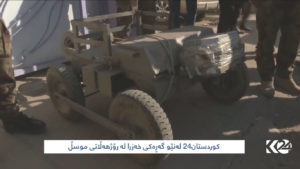by WorldTribune Staff, December 2, 2016
Iraq’s effort to liberate Mosul is being significantly slowed by Islamic State of Iraq and Levant’s (ISIL’s) use of remotely-guided car bombs.
The terror group is sending out vehicle-borne improvised explosive devices (VBIEDs) “at the astounding rate of 14 per day” around Mosul, according to the Washington Post.

“The group has innovated its use of the weapons, up-armoring the vehicles and sending them towards Iraqi forces’ lines to break through and cause chaos. The bombs are causing heavy casualties among Iraqi forces and slowing down what’s already a frustratingly slow fight to dislodge the terrorist group from its urban stronghold.”
Brig.-Gen. Esmat, a Kurdish commander in the Iraqi Special Forces, told a Kurdistan24 reporter that “nearly 20 kilograms of TNT can be attached to the remote-guided” car bombs.
The UN reported that at least 1,959 members of the Iraqi security forces were killed in November.
UN special representative for Iraq, Jan Kubis, said the casualty figures were “staggering”.
“In its desperate attempt to cling on to territory it controls in Mosul and Nineveh areas, [ISIL] has been employing the most vicious tactics, using civilians’ homes as firing positions as well as abducting and forcibly moving civilians, effectively using them as human shields,” he said.
On Nov. 30, the UN warned that as many as half a million people in Mosul – including almost half of all the children in the city – had reportedly been cut off from access to clean water after a major water pipeline was damaged in the fighting.
The International Committee for the Red Cross (ICRC) warned that the offensive to retake Mosul could take months, prompting more and more of the up to 1.5 million civilians believed to be living there to try to flee their homes.
Some 77,000 people have been displaced so far, with many staying in their homes as the government suggested.
